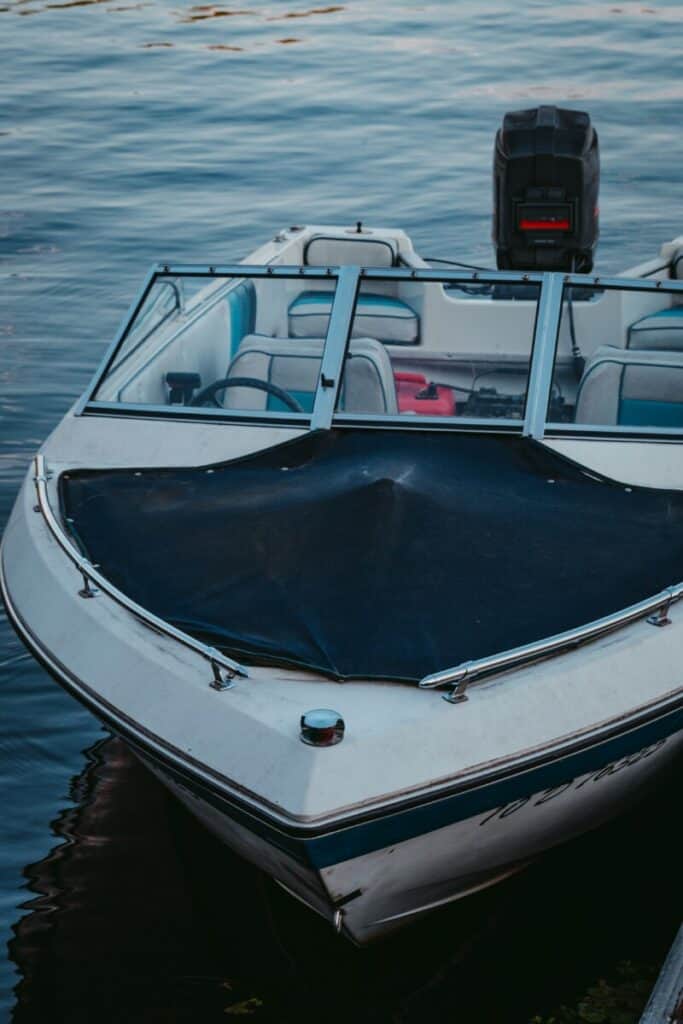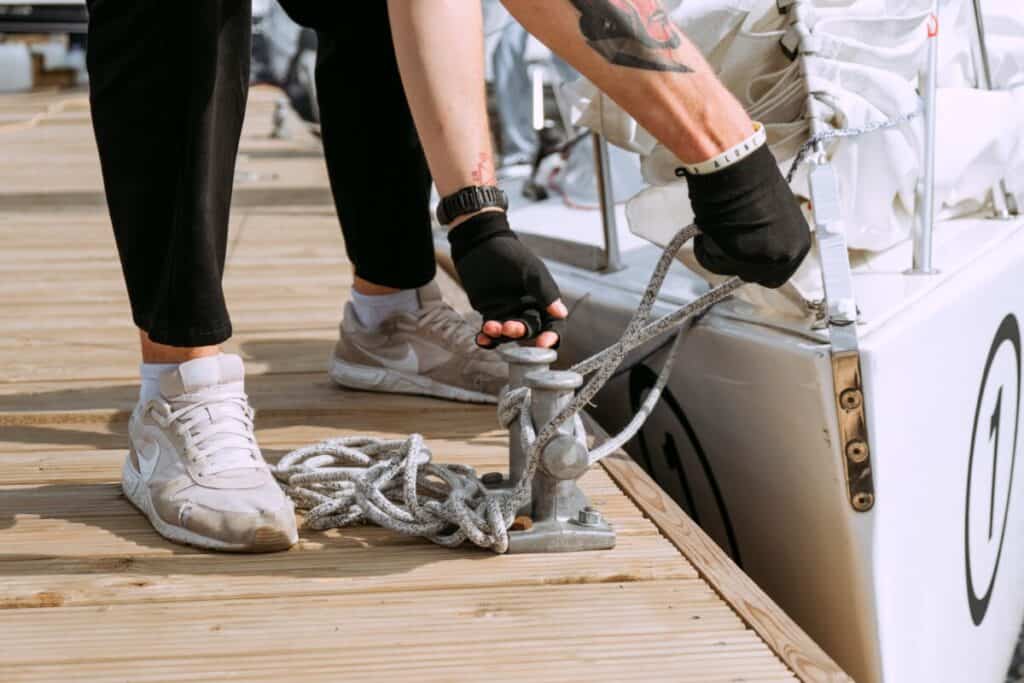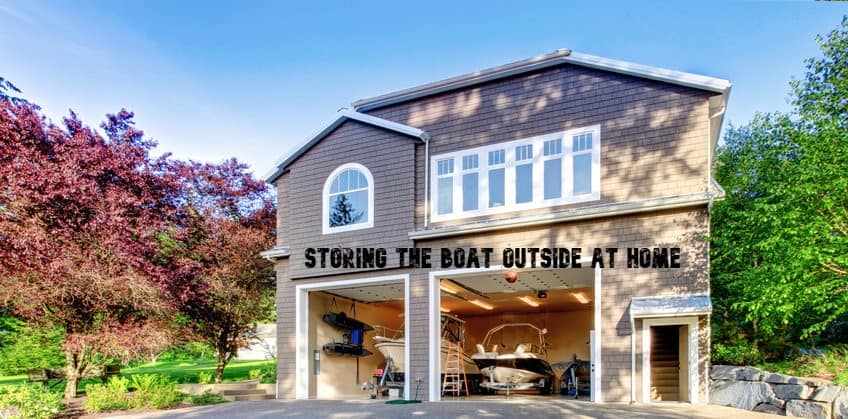A boat – no matter the type or the size – is always a sizable investment. So, the last thing you want to do is store it improperly.
Of course, storing a boat is a lot more serious and responsible task than most people realize, too.
Some folks think that they can just pull the trailer into their driveway, throw a tarp over their boat, and call it a day.
Well, while it sounds perfect, that’s not exactly how things go.
If you’re going to be storing your boat at home, there are some critical things you need to know. Therefore, we gathered some important things you have to consider that you might not have thought of, and some tips and tricks for storing a boat outside at home that you can pick up in this quick guide below.
Let’s dig right into it, shall we?
Don’t Store a Dirty Boat
The absolute worst thing you can do when storing a boat outside at home is simply pulling it in your driveway, parking the trailer, and then throwing a cover over it.
That’s a surefire recipe for a lot of headache the next time that you want to take your boat out!
For one thing, you’re probably going to hit the water and realize just how cluttered you left your boat the last time that you took it out. That’s going to detract big time from your overall experience, and you’ll spend a lot more time cleaning your mess than you will be enjoying the water.
On top of that, anything left inside your boat – food, snacks, drinks, etc. – is going to attract critters, insects, and other unwanted pests.

This is why you always (ALWAYS) clean the boat out from top to bottom before you store it in your driveway.
There are plenty of stories of people ignoring this advice only to bring the garbage out at night and discover a family of raccoons has made the cabin their home.
Don’t let that happen to you. Clean things out from top to bottom before throwing a cover over your boat!
Keep Your Boat Out of the Driveway
For many reasons (most of them obvious and reasonable) plenty of people prefer to store their boat outside at home in their driveway.
It’s easy to pull into a driveway, park a trailer with a boat on top, and then disconnect – knowing that you aren’t going to have to fiddle or fight with getting your boat out the next time that you want to hit the water.
‘Having a boat out in your driveway is like sending up a flare to criminals that you are loaded. Having displayed a beautiful possession that could be easily accessed, gives a hint to the ‘sticky-fingered intruders’ that you probably have other nice things in your home.‘

This is not the kind of invitation you want to be sending out.
On top of that, a bulky boat parked in the driveway is always going to take up a lot more space than you expect.
It’s going to get in the way of people trying to pull into your driveway and trying to get out. It’s going to be a nightmare to plow or snow blow around. It is generally just going to cause a lot more headache and hassle than necessary.
Unless you have waterfront access nearby, you probably don’t need to keep your boat so close at hand. Keep it closer to the water (if possible) with secure, safe, professional storage, and you’ll be a lot happier!
Don’t Just Throw a Tarp Over Your Boat
A lot of newbie boat owners get their hands on a halfway decent boat cover, especially when they expect to have to cover their vessel for a couple of months when the weather is less than ideal.
Many modern covers are specifically designed to allow moisture out of the boat but protect water from getting in, too. These covers are game-changers that are going to make storing and maintaining your boat a whole lot easier.

Some folks, though, decide that any cover that keeps water out of the boat is “good enough” – and so they throw a blue tarp over their vessel and call it a day.
That’s a major mistake.
For one thing, you’re never going to get the kind of fitment you need out of a blue tarp to fully secure and protect the inside of your boat. You’ll end up letting in wind and weather (lots of water), a lot more than you ever expected.
Secondly, though, these tarps just aren’t designed to allow moisture to escape your boat in the first place.
Keeping water and moisture out of your vessel is a huge piece of the puzzle, but you want to avoid locking moisture into your vessel, either.
That’s how you get rust. That’s how you get corrosion. And that’s how you find your delicate boating electronics ruined the next time that you go to take your boat out on the water.
Invest in a high-quality cover, one with a custom fit (or an adjustable fit), and one that has been designed to prevent water from getting in but allow moisture to escape at the same time.
This is a huge piece of the puzzle!
Don’t Forget to Pull Your Drive Belts
When boat owners are looking over their vessel for things to “winterize” when they know long-term storage is ahead, they usually target a few key areas:
- They stabilize the fuel that is in their engine
- They fog the oil that protects core components of their drivetrain and exhaust
- They maintain their steering column with plenty of grease to keep things nice and lubricated
- And they usually disconnect the battery and fully secure all main components
What they might not do, though, is pull the drive belts out of their engine for long-term storage. And that’s a major mistake!
You can do absolutely everything else correct (stabilize, maintain, and secure all the main components of your boat for long-term storage), but if you forget about the drive belts you are going to be in a world of hurt.
These kinds of belts are notorious for cracking and snapping if they are kept under extreme amounts of tension for an extended amount of time – especially if the boat isn’t running.
You want to loosen these drive belts (at the very least) to prevent this extreme tension from destroying them, but you may want to pull them out of position entirely to guarantee that they aren’t going to break down.
If you do decide to remove the belts, make sure that you aren’t storing them outside or in direct sunlight. You want to keep these belts soft and supple, as elastic as they have to be, and UV light will do a real number on them.
Don’t Skimp on Security!
Finally, if your boat is going to be spending a lot of time in your driveway, you need to make sure that you invest in quality security setups.
As we highlighted above, nothing sends a bigger flare into the air that a house is filled with “goodies” than a home with a beautiful boat parked in the driveway.
First, you want to make sure that your boat trailer is completely secure. If it’s easy for you to back into your driveway, hook up to your hitch, and drive out with your boat, it’s going to be easy for anyone else to do the exact same thing!
Make sure that your trailer is completely locked down and immobile unless you are the one using it.
Secondly, you need to make sure that your boat cover is as safe and as secure as possible.
Sure, any thief with a razor blade could cut right through most covers without a hassle, but if your boat is difficult to get into they might avoid it entirely.
It’s also a good idea to secure any of the valuables you have stored in your boat, particularly expensive accessories and upgrades. Fish finders, GPS units, and radios are always a “big-ticket item” for criminals to try and separate from your boat.

Lock them down, secure them, and protect them and you’ll have a lot less to worry about.
Finally, it’s important to make sure that you secure the area around your boat as much as possible, too.
Lots of security lighting, motion lighting, and certainly floodlighting goes a long way towards dissuading criminals from trying to do anything to your boat – or anything to your home near your boat, too.
It’s not a bad idea to have cameras up and running outside, especially if they are motion detection cameras and can connect to your Wi-Fi.
You’ll be able to get alerts about any potential activity on or near your boat, no matter where you are with Wi-Fi capabilities. That’s a game-changer!
Closing Thoughts
At the end of the day, storing your boat in the driveway definitely comes with a whole bunch of drawbacks and quite a bit of downside.
There’s certainly a lot of convenience and a lot of utility to just pulling your boat into the driveway, to be sure. But there’s also a lot of frustration that many new boat owners are unaware of – and that a lot of veteran boat owners overlook completely.
Use the inside information highlighted above to help you better decide whether storing your boat at home in the driveway is a good idea.
If you’re going in this direction no matter what, use the tips and tricks outlined above to avoid some of the biggest dangers and pitfalls this decision brings to the table, too.
With a bit of diligence, a little planning, and a little bit of extra effort you can minimize a lot of these problems and give yourself some peace of mind.
Have fun out there on the water!
Ahoy.
While you are here, check these other fun reads that we got in stock for you.
How Close to the Property Line Can I Build a Garage?

